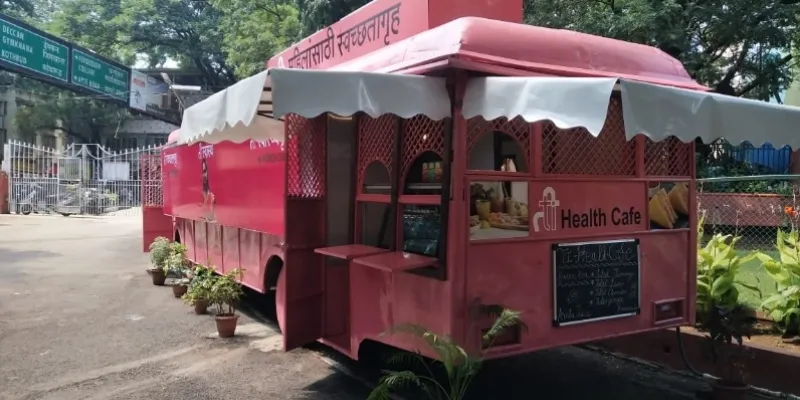Pune duo drive change, transform discarded buses into clean toilets for women
Under the ‘Ti for Toilet’ initiative, Rajeev Khera and Ulka Sadalkar have collaborated with the Pune Municipal Corporation to convert old buses into modern and clean toilets for women.
Poor sanitation is not a problem only in rural India but also exists in urban areas. Some of the reasons being lack of public toilets and not so well-maintained toilets. While most men decide to take a leak in the open, women find it a menace as the public toilets are often filthy.

Looking at the problem, Pune-based Ulka Sadalkar and Rajeev Khera, both entrepreneurs in the sanitation sector, decided to make women sanitation their prime focus. For the past 13 years, the duo has been working towards the issue.
In 2016, they initiated mobile toilets for women in collaboration with the Pune Municipal Corporation (PMC). The initiative was started under ‘Ti for Toilet’ (Ti means ‘her’ in Marathi), an idea which was initiated by 3S, a division of Sara Plast, which is headed by the duo.
In an interview with NDTV, Rajeev Khera said,
We have been in the business of sanitation for a long time now, and we try to look for new innovations regularly. In one of our researches, we came across an organisation that puts old buses to use by installing toilets in them. There are several public buses in Pune that end up at landfills or with scrap dealers, and so we decided to make use of them.
For this initiative, buses that were 13-years or older were used and modified into a public toilet for women.

So far, there are eleven bus-toilets stationed across the city. Some of the locations picked to station these toilets are parks, tourist places, commuter areas, busy crossroads, and communities near slums.
Khera further said,
We have the liberty to move the buses. But if it is stationed in one place, then women will not have to search for them every time they must answer nature’s call. This way, they can also tell their friends, peers, and colleagues about it. On an average, close to 150 women use these toilets per day.
The PMC provides parking spots for the buses, whereas many corporates such as Indus Towers, Builders Association, Firmenich, etc. have provided with financial resources under their Corporate Social Responsibility (CSR) initiatives, reports Civil Society Online.

As per Sadalkar, it would have been impossible to run the bus as it would have cost Rs 50,000 to Rs 60,000 per month to maintain just one restroom.
In addition to western and Indian toilet facilities, the bus has a solar panel on top and is integrated with WiFi. It also houses facilities like diapers and sanitary napkin dispensers, a washbasin, a screen presenting the status of cleanliness, and a staff to assist users. The model is still not self-sustainable, and hence the users are charged Rs 5 every time they use.
Talking about the present scenario, Sadalkar told Civil Society Online:
“We are working with Unilever, Kimberly-Clark, and Firmenich to refine our business model and prepare for scale. It’s incredible how much we have learnt about marketing, branding, human resources, finance, and work styles from companies. We also have regular webinars with them. Also, the transformation has underlined the importance of talking to our clients and initiating behaviour change.”
Do you have an interesting story to share? Please write to us at [email protected]. To stay updated with more positive news, please connect with us on Facebook and Twitter.







